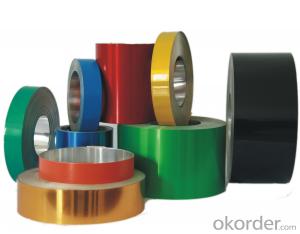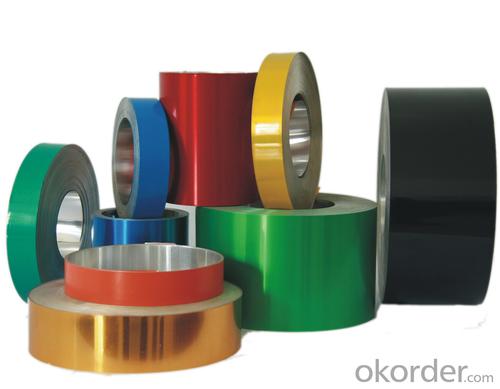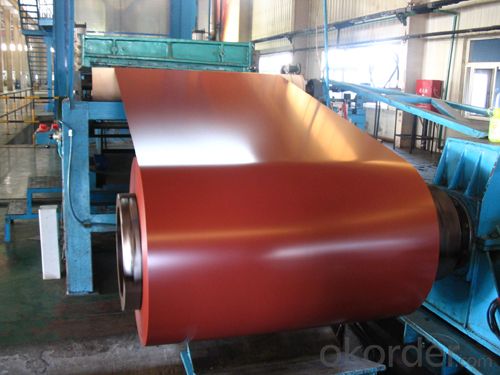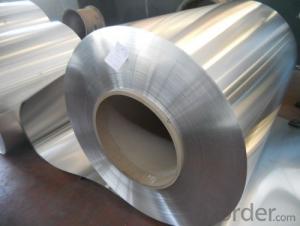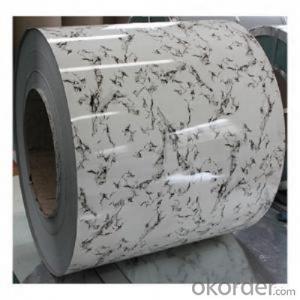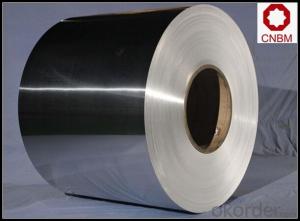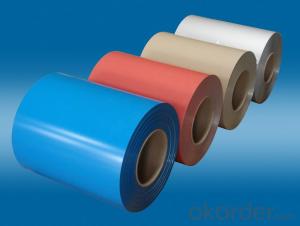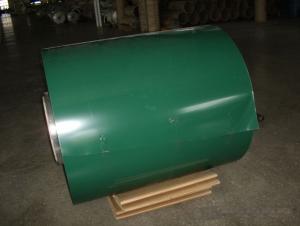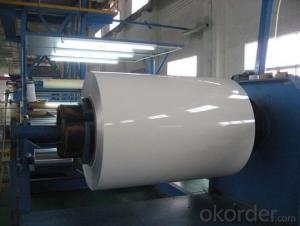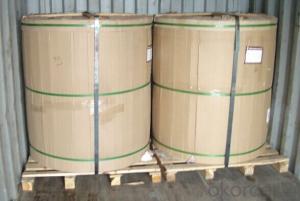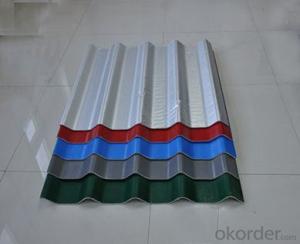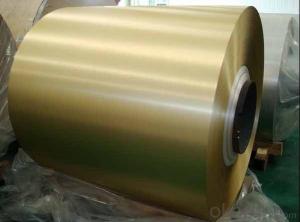Aluminum Roofing Sheet Coils - Coated Aluminium Coil/Roll for Aluminium Roller Shutter
- Loading Port:
- Tianjin
- Payment Terms:
- TT OR LC
- Min Order Qty:
- 2 m.t.
- Supply Capability:
- 50000 m.t./month
OKorder Service Pledge
OKorder Financial Service
You Might Also Like
Specification
Coated Aluminium Coil/Roll For Aluminium Roller Shutter
Description
Alloy | 1060, 1100, 3003, 8011, etc. |
Temper | H16, H18, H24, H26, H28 |
Thickness | From 0.05mm to 3.0mm |
Width | Standard width:1240mm |
Special width:1300mm, 1520mm, 1570mm, 1595mm | |
Diameter | Standard dia:1200mm |
Interior dia:150mm,405mm,505mm | |
Weight | 2.5 T/coil,3.0 T/coil |
Coating | PE, PVDF, ACRYLIC |
Surface | Embossed, mill finish, coated |
Color | AS to code RAL |
Gloss | 10-90%(EN ISO-2813:1994) |
Coating Thickness | PE: more than 18 micron |
PVDF: more than 25 micron | |
Coating Hardness(pencil resistance) | More than 2h |
Coating adhesion | 5J (EN ISO-2409:1994) |
Impact Resistance | No peeling or cracking(50 kg/cm,ASTMD-2794:1993) |
Flexibility(T-bend) | 2T |
MEK resistance | More than 100 |
Advantage | 1.High temperature resistant 2.Weathering resistant 3.Scrubbing resistant 5.Acid or alkali proof 6. Fireproof 7.Light weight material is easy to construct and install |
Out package | Wooden splint with export standard |
Application | ACP, wall cladding, facades, roofs and canopies, ceilings, signboards, blind window, display platforms, electrical panels, etc |
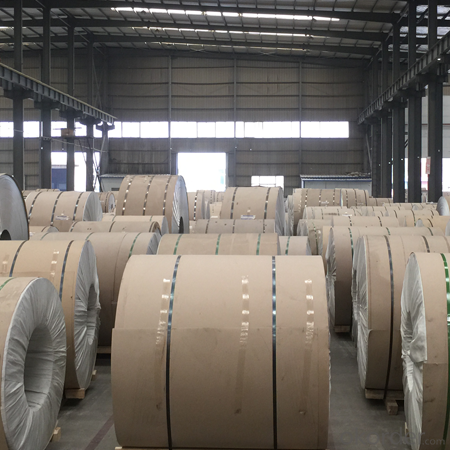
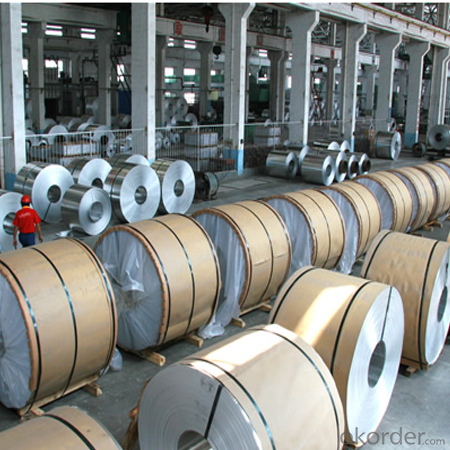
Manufacturing
Decoiler → Accumulator →Tension Leveler →Acid & Alkali Cleaner → Rinse →Conversion Treatment → Priming coater →Infrared Curing Oven →Main coater →Floatation Curing Oven →Strippable Film Applicator → Exit Accumulator → Recoiler
FAQ
--Q: Do you provide free samples?
--A: Yes, free samples will be sent to you on freight at destination.
--Q: Can I get your latest products catalogue?
--A: Yes, it will be sent to you in no time.
--Q: What is the MOQ?
--A: 2 tons
--Q: What are your payment terms?
--A: We accept L/C, T/T.
--Q: What kinds of alloy can you supply?
--A: 1000 series: 1050, 1060, 1070, 1100, 1145, 1200
3000 series: 3003, 3004, 3105, 3104
5000 series: 5052, 5083, 5754, 5182
6000 series: 6061, 6063, 6062, 6063
8000 series: 8011, 8021
--Q: What kinds of temper can you supply?
--A: O-H112: O,H12,H14,H16,H18,H22,H24,H26,H,32,H34,H111,H112
T3, T4, T6
- Q: Why the aluminum sheet crack after?
- What I want to add is to choose such welding wires as 5383 or 5183 wire whose magnesium content is higher than 5754 wire. The loss of magnesium due to high temperature in welding process may reduce the intensity of welding area.
- Q: How are aluminum coils protected from damage during transportation?
- Aluminum coils are protected from damage during transportation through various measures such as using protective packaging materials like plastic or wooden crates, securing them with straps or bands to prevent movement, and using padding or cushioning materials to absorb shocks and vibrations. Additionally, coils may be wrapped in protective films or coated with anti-corrosion agents to safeguard them from environmental elements during transit.
- Q: Can aluminum coils be used in transformer windings?
- Yes, aluminum coils can be used in transformer windings. Aluminum is a commonly used material in transformer windings due to its lightweight and cost-effectiveness compared to copper. However, aluminum has higher resistivity than copper, so larger cross-sectional area or thicker wire needs to be used to compensate for the higher resistance.
- Q: Can aluminum coils be used in high-altitude environments?
- Indeed, the utilization of aluminum coils is feasible in high-altitude settings. Thanks to its lightweight and resistance to corrosion, aluminum is a fitting material for various purposes, including in high-altitude scenarios. Aluminum coils are often employed in air conditioning systems, heat exchangers, and refrigeration units, all of which can operate efficiently at high altitudes. The high strength-to-weight ratio of aluminum enables it to endure the harsh conditions encountered at high altitudes, encompassing low temperatures, strong winds, and low atmospheric pressure. Moreover, aluminum is non-magnetic, providing an advantage in specific high-altitude applications like aerospace and satellite technologies. Additionally, aluminum exhibits exceptional thermal conductivity, facilitating efficient heat transfer and rendering it perfect for deployment in cooling systems functioning in high-altitude environments. Its resistance to corrosion also ensures durability and the ability to withstand the impact of moisture, which can be prevalent in such settings. All in all, owing to their lightweight nature, resistance to corrosion, thermal conductivity, and strength, aluminum coils serve as a dependable and appropriate choice for utilization in high-altitude environments.
- Q: Can aluminum coils be used for food processing equipment?
- Yes, aluminum coils can be used for food processing equipment. Aluminum is a popular material choice for its excellent heat transfer properties, corrosion resistance, and lightweight nature. It is commonly used in the construction of food processing equipment such as heat exchangers, evaporators, and condensers.
- Q: Is it possible to construct furniture or tables using aluminum coils?
- <p>Yes, aluminum coils can be used to make furniture or tables. Aluminum is a versatile material known for its strength, durability, and lightweight properties. It can be easily bent and shaped into various forms, making it suitable for furniture construction. Aluminum coils can be used to create the frame or support structure of tables and other furniture items. They are also resistant to corrosion and require minimal maintenance, making them a popular choice for outdoor furniture and modern interior designs.</p>
- Q: How much is one square aluminum gate and five hard door?
- On the Alibaba website search "roll gate", there are many manufacturers, you can ask them.
- Q: How do aluminum coils perform in coastal areas with high salt content?
- Aluminum coils perform relatively well in coastal areas with high salt content due to their inherent corrosion resistance. Aluminum has a natural oxide layer that forms on its surface, providing a protective barrier against saltwater and preventing corrosion. This oxide layer is highly resistant to salt-induced corrosion, making aluminum coils suitable for coastal environments. However, it is important to note that saltwater can still have some corrosive effects on aluminum over time, especially in areas with constant exposure to salt spray and high humidity. To enhance the performance and longevity of aluminum coils in such coastal areas, additional protective measures can be taken, such as applying specialized coatings or utilizing alloys with higher corrosion resistance. Regular maintenance and cleaning of the coils are also essential to remove any salt deposits that may accumulate on the surface. This can be done by rinsing the coils with fresh water periodically to remove salt residue. Additionally, avoiding the use of abrasive cleaners or harsh chemicals is crucial to prevent any damage to the protective oxide layer. Overall, while aluminum coils offer good resistance to saltwater corrosion, proper care and maintenance are still necessary to ensure optimal performance and prolong their lifespan in coastal areas with high salt content.
- Q: What are the common problems faced with aluminum coils?
- Aluminum coils encounter various issues that commonly arise. The foremost predicament is corrosion, which poses a significant threat to aluminum coils, especially when they come into contact with moisture. Consequently, rust or other types of corrosion may develop, thereby weakening the coil and impacting its performance. Another prevalent problem is coil damage, which can be easily incurred during handling or transportation. This can result in coils becoming bent or dented, thus compromising their efficiency and lifespan. In severe cases, leaks or cracks may even manifest, leading to the leakage of refrigerant or coolant. Clogging is an additional concern that can manifest in aluminum coils. Over time, dust, dirt, and debris can accumulate on the coil, thereby obstructing airflow and diminishing the coil's efficiency. This can lead to subpar cooling or heating performance, heightened energy consumption, and increased wear and tear on the system. Furthermore, aluminum coils are susceptible to leaks. These leaks may stem from physical damage, corrosion, or manufacturing defects. Once a coil develops a leak, refrigerant or coolant may escape, consequently impacting the overall performance of the HVAC system. Lastly, improper installation or maintenance practices can also give rise to issues with aluminum coils. If the coil is not installed accurately or if regular maintenance is overlooked, problems such as inadequate airflow, inefficient cooling or heating, and heightened energy consumption may occur. To circumvent these common problems, it is imperative to adequately maintain aluminum coils by regularly cleaning them, inspecting for signs of damage or corrosion, and ensuring proper installation and handling. Consistent maintenance and timely repairs can mitigate the occurrence of these problems and guarantee the longevity and efficiency of the aluminum coils.
- Q: Can aluminum coils be used in the production of automotive parts?
- Yes, aluminum coils can be used in the production of automotive parts. Aluminum is a lightweight and durable material, making it suitable for various automotive components such as body panels, engine parts, and heat exchangers. Its corrosion resistance and excellent thermal conductivity also make it a popular choice in the automotive industry.
Send your message to us
Aluminum Roofing Sheet Coils - Coated Aluminium Coil/Roll for Aluminium Roller Shutter
- Loading Port:
- Tianjin
- Payment Terms:
- TT OR LC
- Min Order Qty:
- 2 m.t.
- Supply Capability:
- 50000 m.t./month
OKorder Service Pledge
OKorder Financial Service
Similar products
Hot products
Hot Searches
Related keywords
